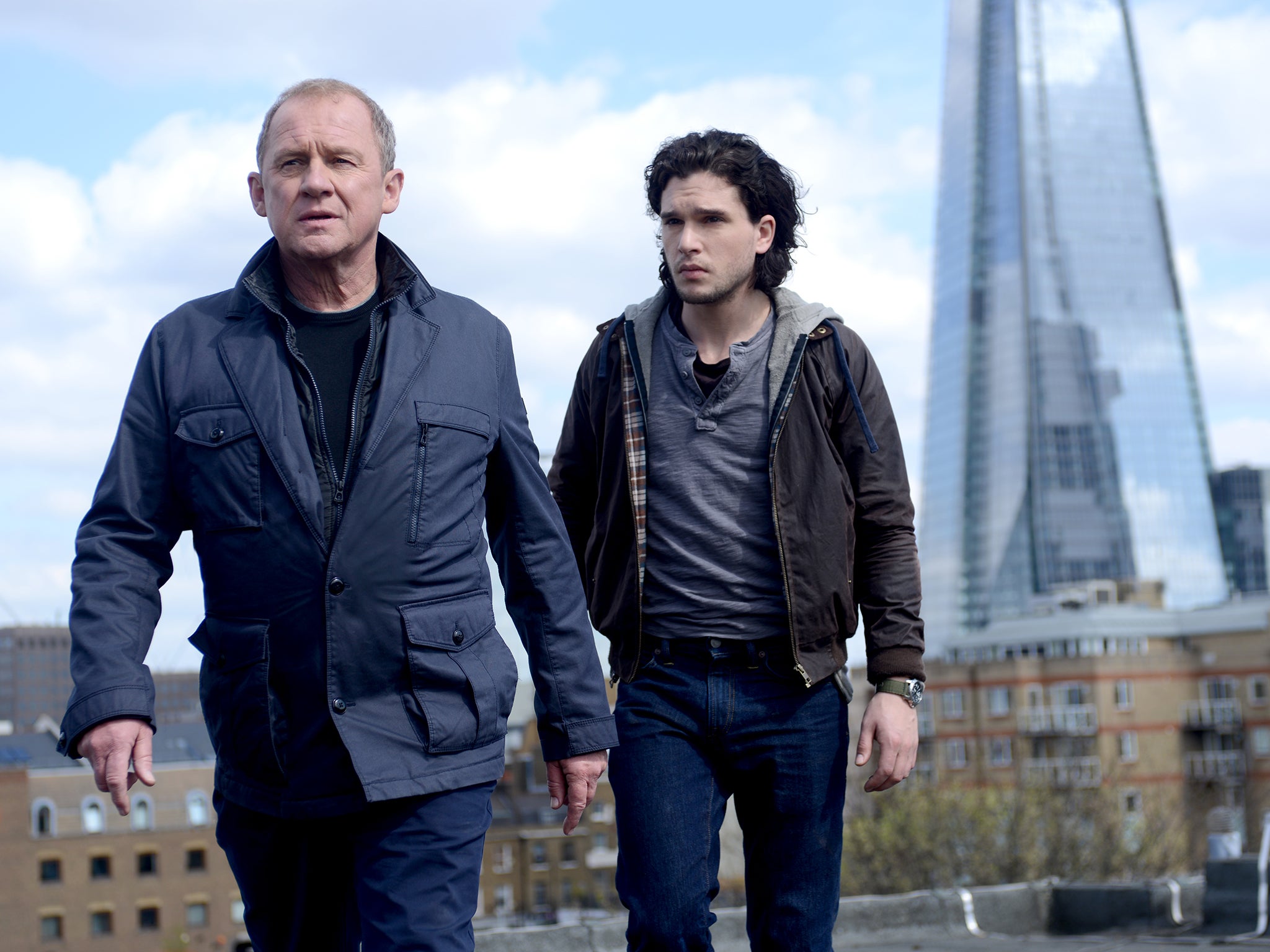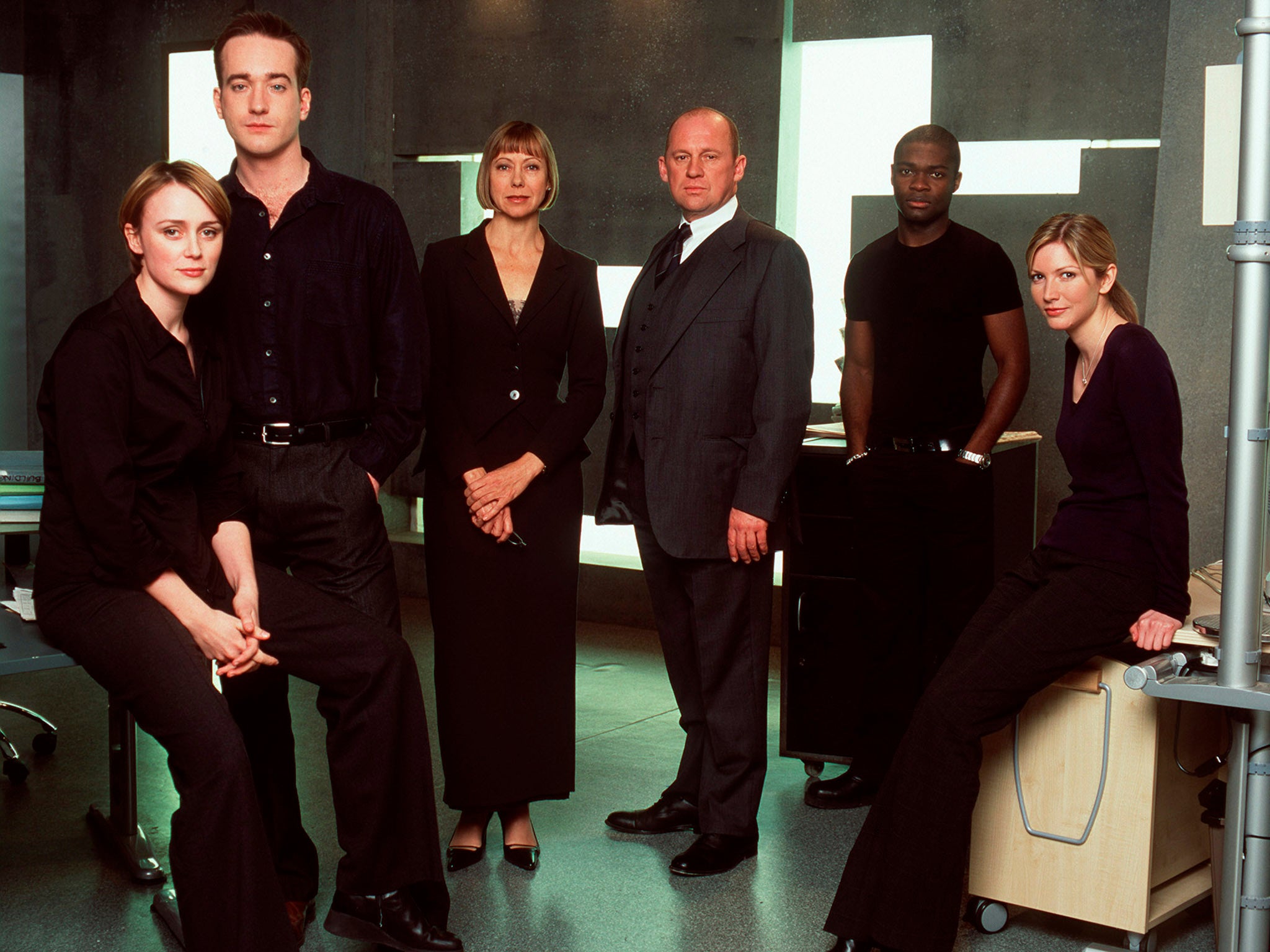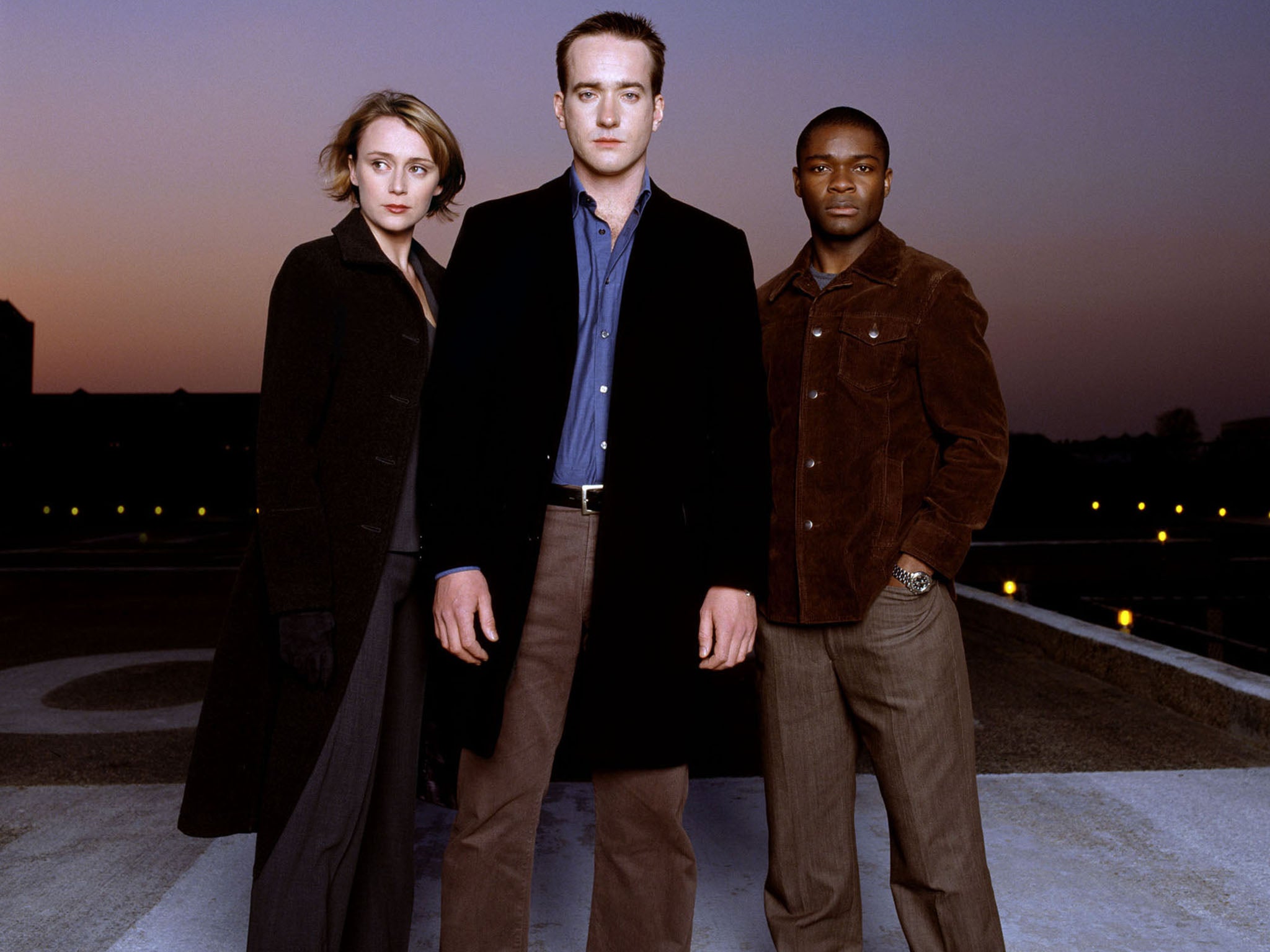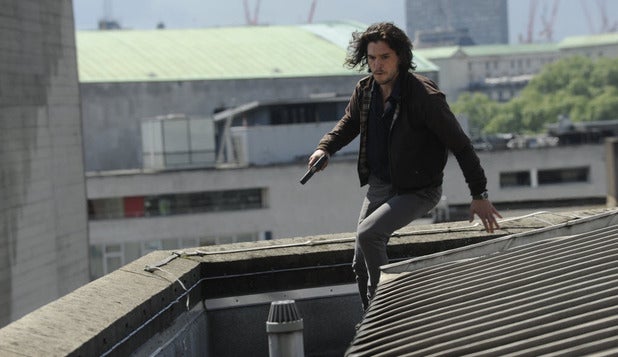Spooks: The Greater Good: Will the movie have the same huge impact as the original series?
Spooks was one of TV’s most popular shows - Alice Jones asks the stars if the forthcoming film version can live up to expectations

Your support helps us to tell the story
From reproductive rights to climate change to Big Tech, The Independent is on the ground when the story is developing. Whether it's investigating the financials of Elon Musk's pro-Trump PAC or producing our latest documentary, 'The A Word', which shines a light on the American women fighting for reproductive rights, we know how important it is to parse out the facts from the messaging.
At such a critical moment in US history, we need reporters on the ground. Your donation allows us to keep sending journalists to speak to both sides of the story.
The Independent is trusted by Americans across the entire political spectrum. And unlike many other quality news outlets, we choose not to lock Americans out of our reporting and analysis with paywalls. We believe quality journalism should be available to everyone, paid for by those who can afford it.
Your support makes all the difference.Chances are, if you were watching BBC1 on 20 May, 2002, you may not have forgotten what you saw at around 9.40pm. It involved a pretty, blonde actress playing a promising MI5 trainee, an undercover operation gone wrong and a kitchen gadget. As her fellow spy refused to give the villain what he wanted, poor Helen had her hand, then her head, plunged into a bubbling deep-fat fryer. Seconds later, she was shot in the head at point-blank range.
So it was that Spooks announced its arrival on the scene – and became the most complained-about television moment of the year in the process. This was only the second episode of the spy series and Lisa Faulkner, as Helen, had been marketed as its biggest star. Her grisly death had originally been pegged for the season finale but, in a decision that would come to characterise the show, it was moved up – the better to make viewers spit out their hot chocolate.
“We hit upon the idea of having a major character die early on to show that this isn’t one of those shows where the cavalry comes,” says David Wolstencroft, the creator of Spooks. What is now standard Game of Thrones practice was quite revolutionary 13 years ago. “The writers on [the American spy series] Alias told me that JJ Abrams was always talking about that scene because it was the first time it had been done in television history. That’s how you do it, that’s how you make sure that everybody is bloody terrified. It suddenly means that it’s a real world. Now all bets are off, and you’d better watch the show. And you’re going to care, because if we’re saying that Danny’s in trouble, Danny might really be in trouble.”
Danny, another original Spook, played by David Oyelowo, did indeed end up in trouble – although not fatally until the end of series three, when he was executed by a terrorist. His demise was followed by that of many, so many, more, agents. Fiona (Olga Sosnovska) was shot by her ex-turned-terrorist Farook, Colin (Rory MacGregor) was hanged from a tree by MI6 officers and Zaf (Raza Jaffrey) was kidnapped, then tortured to death. Ben (Alex Lanipekun) was garrotted by rotten Spook Connie (Gemma Jones) with a blade she had hidden in her bra, then, in the next episode, she blew herself up defusing a nuclear bomb. Jo (Miranda Raison) sacrificed herself to be shot by fellow operative Ros (Hermione Norris), who was later killed by a hotel bomb. Lucas (Richard Armitage) jumped off a roof, Tariq (Shazad Latif) was poisoned with hydrogen cyanide and Ruth (Nicola Walker) was stabbed just as she had vowed to retire and live happily ever after in the final episode. No one was safe, and especially not your favourite – as I learned when series seven opened with the bombshell, literally, of Adam (Rupert Penry Jones) being blown up by a car just seconds after he had saved the day, again. In the first episode of a brand new series! So cruel, Spooks – yet so endlessly, enjoyably watchable.
“You’d see actors when they got their script quickly flip to the back of it to see if their character made it through to the end of the story,” recalls Peter Firth, who played MI5 head Harry Pearce with unswerving patrician dignity throughout all 10 series and 86 episodes. “Apart from the show being high-octane hokum, it’s also character-driven. People like characters so to kill them is a very dramatic tool. It quickly became apparent that it was working, but it was also apparent that you can’t kill everyone. You’ve got to have an anchor man. Harry fitted that role perfectly.”
Harry not only survived to the final episode, broadcast in 2011, but he is now reborn, along with the franchise, in a new British movie. The first Spooks film, The Greater Good, is released next month. Fans of the show will be delighted to learn that it is just like Spooks – a bumper episode, really. The theme music is different but the final scene freezes into an X-ray, just like old times. There is plenty of running down urban alleyways, tense jargon-swapping on the Grid and a threat with a timer on it: in this case, a charismatic, US-educated jihadist called Adam Qasim who escapes from MI5 custody and has a plot to attack London and bring down the British establishment too.
While the cinematic gloss of Spooks always made it a prime candidate for big-screen treatment, it is a gamble. Not least because the British-set spy movie is a crowded field. “It’s a risky thing. The British film industry is littered with the corpses of TV shows that have tried to make the transition,” agrees Firth. “It very rarely works and we were very aware of that.”

Several familiar faces reappear to support Firth’s starring role, including Tim McInnerny as Sir Oliver, chairman of the Joint Intelligence Committee, and other former agents (one return is so unexpected and pivotal it made this long-time Spooks fan squeal in her cinema seat). New cast members have been added, to lure new fans. They include David Harewood (aka, confusingly, David Estes, deputy CIA head in Homeland), and Jennifer Ehle (Lizzie Bennet of old). Kit Harington (Game of Thrones’ Jon Snow), plays new recruit Will Holloway. In time-honoured fashion, he is a bit of a loose cannon and disillusioned with the Service. “You can do good or you can do well,” he says. “Sooner or later they make you choose.”
“To be a good spy, you have to be all of the things Will is – physically adept, very intelligent, good at tracking things down, puzzle-solving and working out what’s going on in people’s thoughts,” says Harington. “But you also have to have an emotional disconnect. Harry definitely has it but Will really doesn’t. He’s an emotional wreck – a fierce, angry young man. I like the idea of being a failed spy because of your emotions, but being brilliant at everything else.”

Watch Apple TV+ free for 7 days
New subscribers only. £8.99/mo. after free trial. Plan auto-renews until cancelled

Watch Apple TV+ free for 7 days
New subscribers only. £8.99/mo. after free trial. Plan auto-renews until cancelled
The film is set mainly in London, with excursions to Berlin and Moscow. It is directed by Bharat Nalluri, who directed the first and last episode of Spooks. He wanted it to be a love letter to London, he says. “The original draft had Vietnam in it and we wrote it all out. We decided it wasn’t true to Spooks, it wasn’t our world. That’s much more Bond. Spooks was all about London and the UK. We were very keen to keep it truthful to what the show was about. But we know we’re making cinema so we wanted to dish something bigger up.”

The set-pieces are longer and the back stories more detailed but this is still Spooks. The characters still do “dead drops” in umbrella shops, wear Barbours and hoodies and shout things like “I’m going to Glasgow!” at climactic moments. “That’s the thing I like about it, it’s not Bond. It’s not about gadgets, or some superhero,” says Harington. “It felt like a British Bourne – it was more grounded. You could imagine that this world existed.”
Spooks ran for 10 series from 2002 to 2011 and aired in 60 countries. It won a Bafta for Best Drama Series in 2003, was nominated several times more and regularly pulled in seven million viewers. It was hokum, but it was high-quality hokum. A flip through the credits reveals a remarkable list of alumni. In addition to those killed off in the list above, Matthew Macfadyen, Keeley Hawes, Jenny Agutter, Robert Glenister and Anna Chancellor were regular agents. Hugh Laurie played the cigar-smoking head of MI6, Jools Siviter, in the first series, before he was poached by House; Simon Russell Beale was Home Secretary for two series; Anthony Head and Lindsay Duncan played former agents.
The guest spots were no less impressive. Jim North, the civil servant who passed secrets to a Serbian villain via the classifieds of the Evening Standard in series two, was played by Benedict Cumberbatch, while Andy Serkis was the rock star whose son was kidnapped in series three. David Threlfall, Douglas Hodge, Sophie Okonedo and Alex Jennings popped up as villains, victims and well-dressed trouble-makers.
Behind the scenes, Edward Hall, Michael Caton-Jones and Justin Chadwick all directed episodes, while the writing team, led by Wolstencroft, featured star names of the British theatre like Howard Brenton, Dennis Kelly, Zinnie Harris and Anthony Neilson.
They would frequently fight over the death scenes, says Brenton. “The producer would say, ‘Matthew [Macfadyen] is leaving’ and the writers would all jump up and down and say, ‘Let me do it, let me do it!’ When you heard one of the principals was leaving, you’d think, ‘Great, I’ll give them the most psychotic path out.’”
Wolstencroft’s idea was to make a show about the human side of espionage. His original pitch was simply “a show about secrecy”, that would explore the lives of ordinary people doing extraordinary jobs. (He named his two heroes Harry Pearce and Tom Quinn after his English teacher, Harry Quinn, who first encouraged him to write). “They are heroes and antiheroes at the same time,” he says. It never set out to glamorise the spy life, like James Bond – the original series did not even have end credits, to maintain an air of anonymity. Still, the MI5 website would report a regular surge of applicants whenever an episode aired.
The show’s spooky ring of truth was down to Wolstencroft’s co-writer Simon Mirren, who “knew some people who knew some people” who acted as consultants on the show. “We had some somewhat shadowy advisors, an ex-MI5 and an ex-CIA guy. Quite formidable,” recalls Brenton. “You could ring them up and ask them questions about what an agent would do if he was stuck in a house with someone waiting outside. The great thing about it was that there were a lot of true stories in Spooks, but you couldn’t tell. It’s what I call ‘the poetry of tosh’. It’s working in a really rather under-the-radar way. A lot of it is true but it looks like just an hour’s entertainment.”

Wolstencroft and his team were putting the first episode to bed when 9/11 happened. “It was a horrific world event that made the show suddenly extraordinarily contemporary,” he says. “It gave it a clear and present responsibility to have impact. Suddenly we had this show that was following the undulations of current events, sometimes anticipating them.” Indeed, an episode in the fourth series about a terrorist bombing King’s Cross station had already been recorded by the time the 7/7 bombings happened. “There were a lot of intelligent people sitting around a table saying, ‘what if?’. Unfortunately the world we live in means that it’s not a question of ‘if’ but ‘when’ these things will happen. So some of the things that we talked about and that made it to the screen were going to come to pass.”
Director Nalluri kept the scripts long – 70 pages instead of the usual 55 for an hour-long show – and shot on three cameras, to give the show its urgency and pace. “You had to keep up with them. There was no slowing down for exposition. We took no prisoners. The characters get things quickly and instantaneously, so we cut it that way.” It was ambitious stuff for the BBC, albeit made with some budget-conscious tricks: car bombs were filmed in a way that meant the crew never had to blow up a car (just roll one over and light it cleverly), alleyways in Tottenham stood in for Istanbul, that sort of thing.
“I’d been watching a lot of West Wing. I liked the pace, that even when people were having a cup of coffee, it sounded like the end of the world,” says Nalluri. “I remember saying that to my actors in the first episode: ‘I know you’re making a slice of toast but I want you to make it like it’s the last slice of toast you’re ever going to have.’ So everything had an energy to it. We never took our foot off the accelerator.”
Though the action was crucial, it was the characters, forever teetering on personal meltdown, that made Spooks. “The popularity of the show was divided between the secrecy and the action elements,” says Wolstencroft. “And it worked best when those two were operating symbiotically.” For Firth, his stand-out moments were all linked to Harry’s burgeoning relationship with Ruth. “It was never scripted. It just emerged from Nicola and I flirting whilst filming – holding a look too long here, a blush there, those little moments between two people that say so much. They grabbed it with both hands and made great television out of it,” he says. “Out of all those people who were killed, she was the hardest to take. I think they probably regret it now.”
The show ended in 2011 because the writers ran out of ideas. “We felt we’d run all the stories. Now the news cycle has gone mad again,” says Nalluri. “You cannot keep up with the stories. Some of the plots we’ve had in Spooks feel old and fuddy-duddy compared to what is happening in the real world now.”
Harington thinks the films “would make an interesting trilogy” and work has already started on a sequel. “It has a huge relevance in terms of its dramatic world,” says Nalluri. “I can’t see this being the end.”
After all, Tom Quinn – written out in the third series of Spooks only to return in the final scene of the last episode to carry out a kill for his old boss Harry – is still at large. If the Spooks writers didn’t kill him off with their usual gruesome glee, there must be a reason…
‘Spooks: The Greater Good’ is released on 8 May
Join our commenting forum
Join thought-provoking conversations, follow other Independent readers and see their replies
Comments